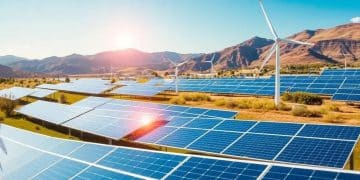Climate change impact: the urgent need for action

Anúncios
Climate change impacts ecosystems by causing habitat loss, increased extinction rates, and altered migration patterns, while strategies like renewable energy and sustainable practices can mitigate these effects.
Climate change impact is a pressing issue that many of us encounter daily. Have you noticed the unusual weather patterns lately? These changes affect not just our climate but also our lives and livelihoods. Let’s delve into how this phenomenon is reshaping our world.
Anúncios
Understanding the science of climate change
Understanding the science of climate change involves exploring the various factors that contribute to the shifts in our planet’s climate. It is essential to grasp how human activities influence these changes.
What causes climate change?
Several elements play a role in climate change. Primarily, the release of greenhouse gases is a significant contributor. These gases trap heat in the atmosphere, leading to increased global temperatures.
Anúncios
Key greenhouse gases include:
- Carbon dioxide (CO2): Emitted from burning fossil fuels.
- Methane (CH4): Released during agricultural practices and landfills.
- Nitrous oxide (N2O): Produced from certain agricultural and industrial activities.
- Fluorinated gases: Synthetic gases used in a variety of industrial applications.
As these gases accumulate, they enhance the natural greenhouse effect, which can lead to drastic alterations in weather patterns. For instance, areas that once enjoyed mild winters may experience severe cold snaps, while regions accustomed to moderate rainfall could suffer from prolonged droughts.
Another crucial aspect to consider is the role of deforestation. As trees are cut down, they release stored carbon, adding to the greenhouse gas effect. Moreover, the loss of forests reduces the Earth’s capacity to absorb CO2, compounding the problem.
Climate change scientists study these interactions to predict future climatic shifts. They utilize climate models that simulate how different factors influence our environment. By understanding the scientific principles behind these models, we can better comprehend the urgency of addressing climate change effects.
Many studies indicate that the consequences of climate change may include not only increased temperatures but also more extreme weather events, rising sea levels, and threats to biodiversity. Acknowledging these impacts emphasizes the need for informed action.
The importance of scientific research
Scientific research plays a vital role in enhancing our knowledge about climate change. Through extensive data collection and analysis, researchers offer critical insights that inform policymakers and the public. Community outreach initiatives also help increase awareness about the effects of climate change, encouraging individuals to take action.
Effects of climate change on ecosystems

The effects of climate change on ecosystems are profound and far-reaching. These changes can disrupt the balance of nature and impact species interactions significantly.
Shifts in habitats
As temperatures rise, many species are forced to migrate to cooler areas. This can lead to habitat loss, as some species cannot adapt quickly enough. For example, polar bears are facing shrinking ice habitats, while fish populations shift to deeper waters.
Key impacts include:
- Loss of biodiversity: Species extinction rates are increasing due to changing conditions.
- Altered migration patterns: Animals may arrive at breeding grounds too early or late, disrupting their reproduction.
- Coral bleaching: Warmer ocean temperatures stress coral reefs, leading to widespread bleaching.
- Pest proliferation: Warmer climates can lead to more pests, affecting plant and animal health.
These effects can create a ripple effect throughout ecosystems. For instance, when a key species is affected, it can jeopardize the entire food chain. The loss of pollinators like bees due to changing climates can threaten plant reproduction, which, in turn, affects herbivores and subsequently the predators that rely on them.
Furthermore, ecosystems like wetlands and forests play crucial roles in storing carbon. As they are altered by climate change, their capacity to mitigate greenhouse gas emissions is reduced. This not only exacerbates the climate crisis but also diminishes their ability to provide essential services, such as water filtration and flood control.
Many researchers stress the importance of preserving ecosystems to help combat climate change. Healthy ecosystems can act as buffers against strong weather events, protecting communities and maintaining biodiversity. Promoting restoration efforts can help ecosystems recover and adapt to the changes ahead.
Impact of climate change on human health
The impact of climate change on human health is a growing concern as rising temperatures and extreme weather events affect our well-being. This phenomenon poses several risks that impact both physical and mental health.
Health risks from extreme weather
As incidents of extreme weather become more frequent, the associated health risks increase. Natural disasters, such as hurricanes and floods, not only cause injuries but also result in long-term health concerns.
Key health issues include:
- Heat-related illnesses: Higher temperatures can lead to heat exhaustion and heatstroke, especially among vulnerable groups like the elderly.
- Respiratory problems: Increased air pollution and allergens can aggravate conditions like asthma.
- Water-borne diseases: Flooding can contaminate drinking water, leading to illnesses such as cholera.
- Mental health impacts: The stress and anxiety from experiencing natural disasters can lead to long-term mental health issues.
Climate change also affects food security, as changing weather patterns can disrupt agriculture. A decline in crop yields can lead to malnutrition, particularly in developing countries where access to food is already a challenge. Additionally, as food prices rise, families may face increased financial strain.
Vector-borne diseases, such as malaria and dengue fever, are also influenced by climate change. Warmer temperatures expand the habitats of mosquitoes, increasing the risk of disease transmission. Understanding these connections helps us realize the broader effects of climate change on our health.
Preventive measures are crucial in combating these health impacts. Public health initiatives should focus on educating communities about preparedness for extreme weather and improving access to healthcare services. By fostering resilience, we can mitigate the health risks posed by a changing climate.
Strategies to mitigate climate change

Implementing strategies to mitigate climate change is crucial for protecting our planet. These strategies can help reduce greenhouse gas emissions and minimize the impacts of global warming.
Renewable energy sources
Shifting to renewable energy is one of the most effective ways to combat climate change. By using energy from sources like solar, wind, and hydro, we can significantly cut down on carbon emissions.
Key benefits of renewable energy include:
- Reduced emissions: Clean energy sources emit little to no greenhouse gases.
- Energy independence: Utilizing local resources can decrease reliance on imported fossil fuels.
- Job creation: The renewable energy sector is rapidly growing, offering new job opportunities.
- Long-term savings: Renewable energy systems can reduce energy costs over time.
Another effective strategy involves enhancing energy efficiency in buildings and transportation. Simple measures like improving insulation, using energy-efficient appliances, and promoting public transit can lead to substantial emissions reductions.
Additionally, reforestation and afforestation are valuable strategies that involve planting trees to absorb CO2 from the atmosphere. Forests play a vital role in carbon sequestration, making them essential in the fight against climate change. A healthy forest can absorb about 48 pounds of CO2 per year for every square meter.
Furthermore, encouraging sustainable agriculture practices can also make a difference. Techniques such as crop rotation, organic farming, and reduced pesticide use can enhance soil health and decrease emissions. Supporting local food systems can cut down on transportation emissions while ensuring fresh produce is available.
It’s important to note that individuals can also contribute to these efforts. Simple actions like reducing waste, using public transport, and conserving water can cumulatively lead to significant change. Each small step contributes to the overall goal of combating climate change.
In summary, the fight against climate change requires urgent action. By implementing effective strategies like using renewable energy, enhancing energy efficiency, and promoting sustainable practices, we can work together to protect our planet. Every individual can contribute to this cause, making choices that lead to a healthier environment. Together, we can mitigate the effects of climate change and create a sustainable future for generations to come.
FAQ – Frequently Asked Questions about Climate Change Mitigation
What are some effective renewable energy sources?
Effective renewable energy sources include solar, wind, and hydroelectric power, which help reduce greenhouse gas emissions.
How can individuals contribute to climate change mitigation?
Individuals can reduce their carbon footprint by conserving energy, using public transport, recycling, and supporting local food systems.
What is reforestation and why is it important?
Reforestation involves planting trees to restore forests, which helps absorb CO2 and improve biodiversity.
What are sustainable farming practices?
Sustainable farming practices include crop rotation, organic farming, and using fewer pesticides to enhance soil health and reduce emissions.





